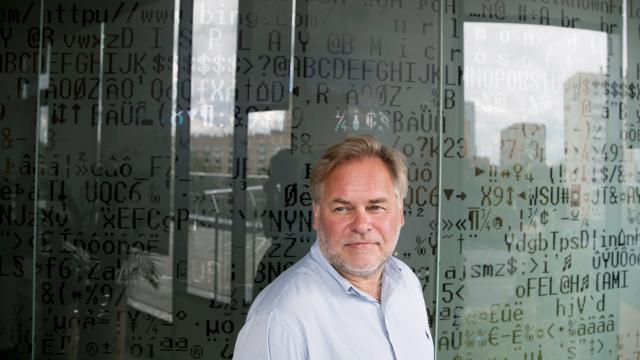Citing accusations of ties between Kaspersky Labs and Russian intelligence, Twitter has moved to ban the Moscow-based security and antivirus provider from continuing to advertise on its platform.
Eugene Kaspersky, Russian antivirus programs developer and chief executive of Russia’s Kaspersky Lab, at his company’s headquarters in Moscow, Russia. Photo: AP
“This decision is based on our determination that Kaspersky Lab operates using a business model that inherently conflicts with acceptable Twitter Ads business practices,” a Twitter spokesperson told Gizmodo. “Kaspersky Lab may remain an organic user on our platform, in accordance with the Twitter Rules.”
In a letter to Twitter CEO Jack Dorsey on Friday, CEO Eugene Kaspersky expressed he was dumbfounded by the decision: “One thing I can say for sure is this: we haven’t violated any written – or unwritten – rules, and our business model is quite simply the same template business model that’s used throughout the whole cybersecurity industry: We provide users with products and services, and they pay us for them.”
Added Kaspersky: “You’re only shooting yourself in the foot when you cater to the geopolitical noise and start refusing to promote material on false pretenses – contrary to the interests of your own business (how else can we describe not accepting money from clients that run ethical businesses?)”
In an email to Gizmodo, Twitter cited a Homeland Security notice about Kaspersky Labs, which states that the US government remains concerned about ties it has alleged between “certain Kaspersky officials and Russian intelligence and other government agencies”, as well as requirements under Russian law that “allow Russia intelligence agencies to compel assistance from Kaspersky and to intercept communications transiting Russian networks”.
Kaspersky, the company’s founder, has adamantly denied that his platform serves as a tool for Russian interception of US communications and data in the past.
In October, The New York Times revealed that Israeli intelligence officers had hacked into Kaspersky’s network and discovered that Russian hackers had used the antivirus software to obtain highly classified material, including hacking utilities, from the National Security Agency, an incident that was previously reported by The Wall Street Journal.
Kaspersky later confirmed that its software was installed on the laptop of an NSA contractor and said the contractor had downloaded a virus while attempting to install an illegal version of Microsoft Windows. When the antivirus software scanned the machine, it detected the virus, but also the hacking tools attributed to the NSA’s hacking team, Equation Group, and uploaded both files to Kaspersky for analysis.
Kaspersky said it plans to donate its Twitter advertising budget to the digital advocacy group Electronic Frontier Foundation.
